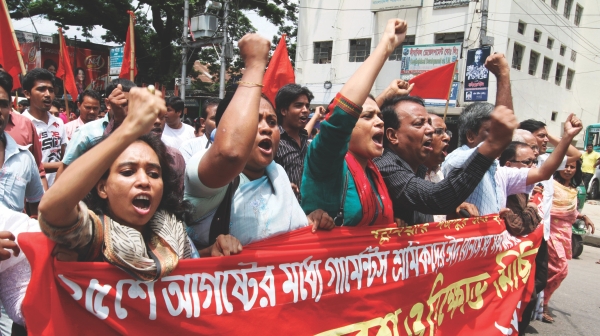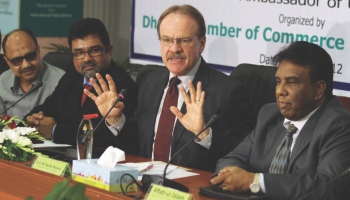| Home - Back Issues - The Team - Contact Us |
 |
| Volume 11 |Issue 34| August 31, 2012 | |
|
|
Economy
Duty-Free Access and the TICFA Complex Naimul Karim The garments industry has seen a number of warning signs this year. From large-scale factory-closures to the controversial death of a workers' leader in Tangail, it won't be an exaggeration to state that the industry, today, is floating on dangerous waters. To make matters worse, a petition filed by the American Federation of Labour and Congress of Industrial Organisations (AFL-CIO) to the United States Trade Representative (USTR), almost cancelled the Generalised System of Preference (GSP) for Bangladeshi goods this year. As per the GSP, the United States allows the duty-free export of a number of products from Bangladesh. While the GSP doesn't include the apparel products of the country, the cancellation of such a deal, however, would have created a negative vibe within the industry in Bangladesh. Fortunately though, in a hearing in January this year, the USTR decided to continue the GSP benefit and further review the country's labour rights issues. The growth of the garments industry in Bangladesh has been indifferent to the GSP. Despite being a Least Developing Country (LDC), Bangladesh pays an average duty of 17 per cent to the United States, a figure that is way more than that is paid to other countries. “France charges us an average duty of 0.85 per cent, Singapore charges around 0.65 percent. The USA charges us a lot more. But the fact remains that 25 per cent of our garment products go to the United States,” says Abdus Salam Murshedy, President, Exporters Association Bangladesh. Adding to the high duty charge is the drop in sales of products to the United States. The economic recession throughout the USA and Europe have lead to a declining sales-graph this year.
The US ambassador's recent statement to Dhaka indicated two things: firstly, the provision of a GSP benefit for garment products is a deal that is still many light years away. The Ambassador was keener on signing a Trade and Investment Co-operation Framework and Agreement (TICFA) with Bangladesh. Secondly, the ambassador re-iterated the need to improve labour standards of the country. The latter has always been an important scale to rate the growth of the apparel factories in Bangladesh and considering the frequent riots in the industrial areas, the ambassador's concerns were no surprise. The US has constantly put pressure to improve the labour standards of the country and create trade unions, as per the USTR's policies. Certain analysts believe that an improvement in the labour standards can provide Bangladeshi apparels with duty-free access. In reality, however, the labour scenario in the country is far from meeting the USTR's expectations. “It's difficult to say as to what we have to do for the USA to give us duty-free access. Yes, they want our labour standards to improve and ensure labour rights. We are also for it. But we need time for development. The situation here is not the same as America. We are developing day by day. The labour standard is much better than before. There are many bindings and shortcomings. America's objectives should be kept in our minds since they are one of our major targets. I personally believe that we are on the right track with respect to labour standards. But we need to develop at a faster rate,” claims MD Fazlul Haque, former President, Bangladesh Knitwear Manufacturers and Exporters Association. In a similar vein, Murshedy says, “There's a huge difference between the labour standards of today as compared to the 80s and 90s. There's always a threat for trade unions to get politicised … It'll take more time, but the process has already started, right from educating the workers about their rights and responsibility and initiating 'better work programmes' etc.” With respect to the signing of the TICFA, members of the garment industry stated that it was a political matter and should be decided between the governments of the two countries. The ambassador stated that signing the TICFA could perhaps be the first step towards a duty-free pathway for the apparel factories. He suggested that Bangladesh lobby the US congress, which decides the access to duty-free markets, a task that Bangladesh has been carrying on for years, but to no avail. TICFA has branched from the Trade and Investment Framework Agreement (TIFA) a deal that collapsed in 2008 following seven years of negotiations. There were many points that Bangladesh opposed during the negotiations and one of the main debates was regarding the Intellectual Property Rights (IPR). As an LDC, Bangladesh has some benefits from the World Trade Organisation (WTO), which weren't included in the TIFA. There was also no guarantee regarding the duty-free access of Bangladeshi garments. The absence of the IPR was a loss for the American companies as Bangladesh is shielded from the Patent Act till 2016, which allows her to avoid huge expenses while exporting certain products. The TICFA aims to improve the bilateral relations between the two countries. Signing a deal of such a high degree can have great ramifications. Farhad Mazhar, noted social activists and economist, explains, “We have a multilateral trade agreement in WTO. Despite the criticism against WTO and its various limitations, the institution may provide dispute resolutions if conflict of interest arises. While US with other rich countries have in principle and practice made WTO ineffective , it is literally putting pressure on the government to enter into bilateral relations since we are an LDC we have advantages and privileges from the WTO and there are scope for negotiations which we might not get through bilateral negotiations that's why I think we shouldn't strike any bilateral trade and investment deal.” Stating an example of the disadvantages of bilateral deals, Mazhar says, “In the previous Science and Technology agreement the IPR was pressed against us which was not only against our interest but over and above our obligations in WTO. Such agreement is detrimental to our interest. Nevertheless, given the enhanced geo-strategic importance of Bangladesh to USA because of its shift to Asia region, USA should provide free access of Bangladesh products to USA market, particularly of garments. Bangladesh must stop repressive measures and allow trade union rights for the workers. We need to deal with USA in terms of tangible mutual benefits. With so many sections in the agreement, it's quite clear that a well-informed decision needs to be taken in this regard. Fortunately for Bangladesh, for once, the ball is in her court. As of now, it seems highly unlikely for companies in the United States to depend on any other country for their garments demand. Also, the location of Bangladesh, according to analysts, holds value for the US, in terms of their presence in Asia. Thus, concerned officials should look forward to translating the geo-strategic importance of Bangladesh into economic benefits in the near future.
|
||||
Copyright
(R) thedailystar.net 2012 |

